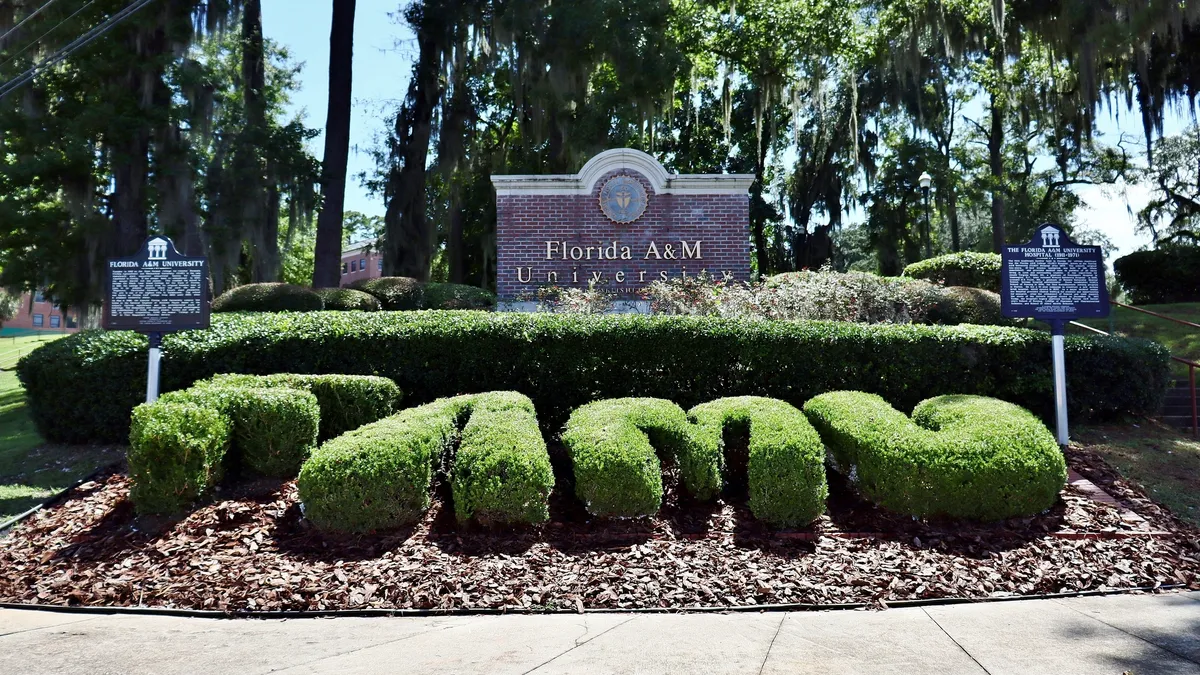Dive Brief:
- A federal judge tossed out a potential class-action lawsuit last week that accused Florida of discriminating against Florida A&M University by underfunding the historically Black institution.
- The lawsuit, brought by students at Florida A&M, accused the state of purposefully engaging in “a pattern and practice of intentional discrimination” that has left Florida A&M “separate and unequal” to the state’s traditionally White institutions. They also accused the state of harming the institution by allowing these colleges to have programs that unnecessarily duplicate those at Florida A&M, undermining its ability to have distinctive offerings.
- U.S. District Judge Robert Hinkle, a Bill Clinton appointee, ruled that the students didn’t show that the disparities between Florida A&M and other state institutions stemmed from “de jure” segregation, meaning separation mandated by law.
Dive Insight:
The ruling deals a major blow to the plaintiffs, who had asked the judge to declare that Florida and its university system had violated the Civil Rights Act of 1964 and the 14th Amendment’s guarantee to equal protection under the law. A law firm representing the plaintiffs declined to comment Monday.
Last year, Hinkle dismissed an earlier version of the lawsuit but allowed the plaintiffs to file a revised complaint.
The students had called out the state’s funding formula, which gave Florida A&M $10,300 per student in the 2018-19 academic year. That’s compared to $14,574 at the University of Florida, a predominantly White institution.
The funding formula may have a racially disparate effect, Hinkle acknowledged, as Florida A&M enrolls higher shares of Black students compared to other state institutions. However, he wrote that the formula isn’t traceable to de jure segregation and isn’t the result of intentional discrimination.
The plaintiffs also accused Florida of inequitably matching federal grants that Florida A&M receives as one of 19 land-grant HBCUs established by the Morrill Act of 1890. Although Florida regularly matched those grants 100% for the University of Florida, the state’s other land-grant institution, it hasn’t done the same for Florida A&M, according to the lawsuit.
Instead, the state has matched the federal grants “at an average of 50% or less,” since 2011, according to the complaint.
The Biden administration echoed those allegations last year, when it told 16 governors that their HBCUs had missed out on more than $12 billion in funding because their states didn’t equitably match federal grants for land-grant institutions.
In Florida’s case, the administration told Republican Gov. Ron DeSantis that the state’s inequitable funding between the University of Florida and Florida A&M had deprived the HBCU of nearly $2 billion over the last 30 years.
Yet Hinkle ruled that students didn’t adequately trace this disparity to de jure segregation. He also wrote that their lawsuit didn’t refute that the disparity “simply reflects Florida’s decision to match federal funding only to the extent required by federal law.”
Hinkle also hit back against the allegations about improper program duplication.
The fact that "FSU and FAMU both offer basic math classes and degrees in accounting — and a host of other disciplines — can hardly be characterized as an impermissible vestige of de jure segregation,” he wrote. “These are standalone, major research universities with their own individual existence, course offerings, and degree programs.”














